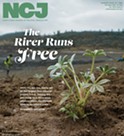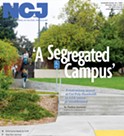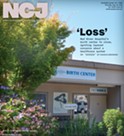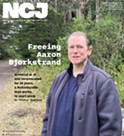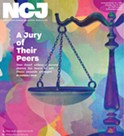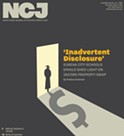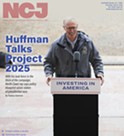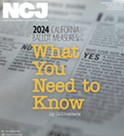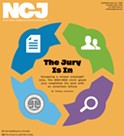RCEA Ponders Nuclear Power
Having long eschewed nuclear energy, board to mull offer of free electricity
By Thadeus Greenson [email protected] @ThadeusGreenson
Photo by Wikipedia-Tracey Adams/flickr
The Diablo Canyon nuclear power plant, once slated to be closed by the end of 2025, will now remain operational at least through 2030.
[
{
"name": "Top Stories Video Pair",
"insertPoint": "7",
"component": "17087298",
"parentWrapperClass": "fdn-ads-inline-content-block",
"requiredCountToDisplay": "1"
}
]
The Redwood Coast Energy Authority Board will soon decide whether to accept an allotment of nuclear power to electrify the North Coast. Either way, local customers will be paying for it.
The local conversation — which will see the RCEA board debate straying from a long-standing policy not to add nuclear power to its energy portfolio — stems from state discussions of what to do with its last operating nuclear power plant 500 miles away. While Pacific Gas and Electric Co. had decided not to seek license renewal for its Diablo Canyon Power Plant in San Luis Obispo County and applied to close the facility in 2018, it reversed course in 2022, after California Gov. Gavin Newsom offered the company a $1.4 billion loan to support its continued operation through at least 2030, with the state facing an unprecedented push for carbon-free power amid unprecedented demand for electricity.
As a result of that deal — and with the state now having a larger portfolio of electricity than previously forecast — PG&E is making allotments of power from its Diablo Canyon reactors available to all California Public Utilities Commission jurisdictional entities, of which Redwood Coast Energy Authority is one. And while the energy would come free of charge to the entities, their ratepayers are already funding the continued operation of Diablo Canyon through a state line adjustment on their bills.
"I'll just say that we know that this is potentially controversial," says Richard Engel, RCEA's director of power resources, adding that he has been reaching out to local environmental groups and other potentially interested parties to spread the word that the decision will be coming before the board Sept. 26. "We don't want people to feel blindsided about it."
RCEA started its Community Choice Energy program in 2017, becoming just the seventh local entity in the state to do so, offering rates 0.5 percent lower than PG&E and promising to keep some of the benefits and control of the program in local hands
"Simply put, we're buying greener, more locally produced electricity and feeding it into the grid," RCEA's CCE website reads. "And we're working in partnership with PG&E, who continues to deliver electricity and maintain the lines as they always have, so there's absolutely no risk to you."
But the financial road has been a bit rocky for RCEA lately, prompting it to abandon the goal of getting its portfolio completely renewable and carbon-free by 2025 due to cost concerns.
"Renewable energy has really gone up in price pretty dramatically," says Engel, explaining that's due to supply chain disruptions, unprecedented demand, international market factors like tariffs, declines in hydroelectric production and even uncertainty regarding the upcoming election, all of which combine to create a seller's market. "There's a lot of things gumming up the works."
At a presentation to the RCEA board last month, The Energy Authority Account Director Jaclyn Harr offered the consultant's quarterly risk management report. In it, Harr reported RCEA was projected to meet 89 percent of local energy demands through renewable and carbon-free sources in 2025 at a deficit of $4.7 million. The following year, its portfolio is projected to be 84 percent renewable and carbon-free, with a surplus of $2.5 million. The balance of needed energy would be purchased through "brown sources," namely natural gas power plants.
As such, the Diablo Canyon allotments come at a potentially enticing time.
Commissioned in 1985, Diablo Canyon currently produces about 9 percent of California's electricity on any given day, and about a quarter of the state's carbon-free energy. But it has been plagued by concerns, including its proximity to the Shoreline Fault less than 1 mile away, safety concerns for employees and future storage of its spent fuel rods. But it was California regulations giving renewable energy production priority over nuclear that prompted PG&E to consider shuttering the facility, one of 89 nuclear power plants in the country. Now guaranteed to remain online for another five years, the state is requiring PG&E to make allotments of its power available to community choice energy providers at no additional charge. (Again, the power is being paid for through a line item on all California energy customers' bills.)
Engel says the Diablo Canyon allotment, if the board chooses to take it, would provide 5 to 10 percent of RCEA's energy needs in 2025. He says if the board accepts the allotment, it could choose to use it in one of two ways.
First, he says, it could simply look at it as a way to reduce costs — and its projected deficit — next year. Alternately, he says, the board could opt to accept it and use the cost savings to further green its portfolio, using the money saved to purchase additional carbon-free hydroelectricity and, potentially, meet its prior goal of 100-percent renewable or carbon free energy.
"That means it wouldn't make our finances look better or worse, it would just make our portfolio look greener," he says.
But Engel says he knows nuclear power is a controversial issue, one that even splits the memberships of some environmental groups divided between the perils of the nuclear energy and the very real threat of the climate crisis and the urgent need to cut emissions.
Environmental groups contacted by the Journal declined to comment for this story, with one referring to the issues as a potential "hornet's nest."
Even in a brief discussion among the RCEA board after Harr's presentation last month, divisions were evident.
Board member and Fourth District county Supervisor Natalie Arroyo asked why RCEA wouldn't accept the allotment.
"I mean, it's being phased out already," she said, adding it would be an "entirely different" conversation if it were about developing a new nuclear facility. "It's another one of those, 'Hold your nose and maybe do it for fiscal reasons' decisions."
But board Chair and Eureka Councilmember Scott Bauer seemed to indicate he has grave concerns about the proposal.
"I will say, as one who's never been a big fan of spent fuel that lasts for like 1,000 generations with no storage yet figured out, I can't say I support anything like nuclear because if we care about future generations, they're going to have to deal with hot material, radioactive material, that lasts forever, essentially," he said. "I wouldn't support it."
In comments to the board, Engel seemed to straddle the line. On the one hand, accepting the allotment in and of itself does nothing to generate more nuclear energy or new plants — it's simply accepting what's already being produced and paid for by ratepayers. On the other, if lots of entities line up to accept the allotments, it could be taken as a sign that demand for nuclear power is robust, fueling Diablo Canyon's continued operation or even the building of new facilities.
Nationwide, a recent Pew Research Center survey in May found a majority of American support more nuclear power, with 56 percent of survey respondents saying they would like to see the building of new nuclear power plants to generate clean electricity. (That trailed the numbers who supported expanding solar and wind, at 78 percent and 72 percent, respectively.)
Engel says RCEA staff was watching what other community choice aggregators providers do faced with the same choice, saying intentionally or unintentionally a uniform response could send a strong message.
"It does send a message if all the CCAs say, 'No, go away," eschewing the offer of free power due to deeply held nuclear concerns. "That sends a different message than if we all snap it up and say, 'Sure,' which they may infer to mean there's an appetite for nuclear energy in California when there may not be."
For more information, including an agenda for the Sept. 26 meeting, visit redwoodenergy.org/board-of-directors.
Thadeus Greenson (he/him) is the Journal's news editor. Reach him at (707) 442-1400, extension 321, or [email protected].
more from the author
-
The River Runs Free
While the sun has nearly set on the largest dam removal project in U.S. history, it's just rising on a restoration effort to return the Klamath River to its natural state
- Sep 12, 2024
-
Union Calls on Providence to Reverse Decision to Close Rehab Unit
- Sep 10, 2024
-
'A Segregated Campus'
Frustrations mount at Cal Poly Humboldt as ADA issues go unaddressed
- Sep 5, 2024
- More »
Latest in News
Readers also liked…
-
'To Celebrate Our Sovereignty'
Yurok Tribe to host gathering honoring 'ultimate river warrior' on the anniversary of the U.S. Supreme Court ruling that changed everything
- Jun 8, 2023
-
Pride in Full Stride
- Jun 29, 2023



